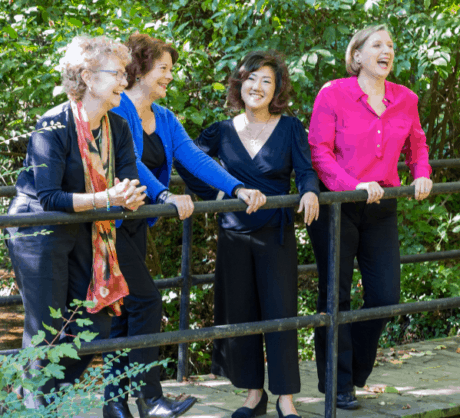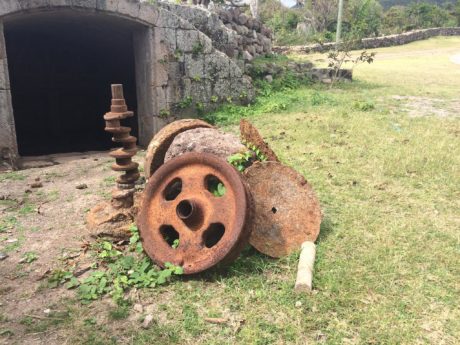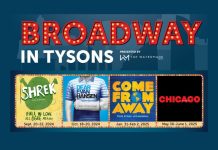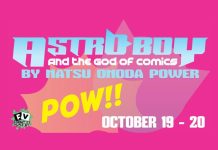Northern Virginia is very much alive and supporting original play development by local playwrights. The diversity of the Northern Virginia demographic provides for fresh experiences to base a play on. One example is the recent launch of Pipeline Playwrights. Pipeline Playwrights is currently composed of four already accomplished Northern Virginia women playwrights with a goal to build “a pipeline to production.”
One of the missions of Pipeline Playwrights is this:
Pipeline Playwrights believes theatre should reflect the reality of our daily lives while exploring the infinite variety of our experiences as women. Our goal is to communicate individual truths that transcend the separate self and bind us together in community.
The four playwrights are Patricia Connelly, Jean Koppen, Soo-Jin Lee, and Ann Timmons.

The four playwrights will work individually and as a team to develop new plays, have public readings, gain feedback from audiences at readings of their plays. The readings will be with professional actors. Readings are to be held over the next few months on Monday nights at Alexandria’s MetroStage.
This is the first of a two-part series about Pipeline Playwrights. This first article will highlight the upcoming works of Ann Timmons and Soo-Jin Lee. Timmons will have a reading of her A Very Present Presence on February 27 Lee will have a reading of her The Men My Mother Loved on March 20.
The second Pipeline Playwrights article will highlight April-May readings of Patricia Connelly’s Around the Snake Turn and Jean Koppen’s Unprotected.
This column is based upon interviews with the playwrights as well as MetroStage’s artistic director Carolyn Griffin. In an interview, Griffin said she was delighted to be able to offer the Metrostage venue for the Pipeline readings. It is a “great way to introduce audiences to new plays and playwrights that they may not yet know.”
David Siegel: Anne Timmons, let’s start with you. Why do you want to be a playwright?
Ann Timmons: I trained as an actor and was acting professionally for several years in NYC and DC. Even before I hit “middle age” I saw there were not enough good parts for women in scripts that were being produced. So I wrote my own one-woman show and premiered it Off Broadway and toured off and on for 16 years nationally. Since then I have gotten commissions and grants to write plays. But always, my primary motivation remains the sharing of stories.
I am fascinated by stories of people who make history, the history that shapes our daily lives as well as history that shapes a whole civilization. By looking past the story told by winners who dominate and distort it in the retelling, I have the opportunity to peel back the layers of “conventional wisdom” and find what really lies underneath. I poke around in these disparities, these gray areas, and find tragedy, comedy, and stories galore. My work explores these stories, disassembles and reassembles the pieces of the puzzle.
Please tell me a bit about A Very Present Presence.
When daily pressures become too much for Alice, her plan to take some time away to sort things out is interrupted by a visitation from her Great Aunt Nell—who died 20 years ago! As Alice navigates a world of ghosts and family secrets, time travel and self-discovery, she learns that her problems spring from sources far deeper than she imagined.
What was the impetus for you to write A Very Present Presence?
I wanted to tell a story of a specific woman trying to sort out her life, but also highlight how the larger world influences all of us, all the time, in ways we may not even be aware of. How decisions made in one place or one time can have a huge effect on people not even born yet. And to play with the notion of the many ways we learn historical lessons. It’s not just through history book! Often is exactly the personal problem that leads us to the political solution.
Who will be reading your work at MetroStage?
Caren Anton tackles the role of Nell, the time-travelling suffragist. Katherine Stanford, recently relocated to the DC area from NYC, is playing Alice. Robin Covington plays the roles of daughter Bets and grandmother Bertie, and Hartley Erickson is playing Lenny (the son) and Lawrence, Bertie’s cad of a husband. Deborah Hensley rounds out the cast–she is the stage directions reader.
What do you hope to obtain/gain from the reading before a live audience?
This play had a reading at The Kennedy Center’s Page-to Stage Festival in September and I have made some slight changes. So I will be seeing how/if those have solved the problems I hoped they would. But mainly I am looking for a sense of rhythm and flow, and how some of those mechanical things like transitions and timing work. I haven’t gone back into rehearsal yet with this revised script, but I am sure I will have more specific questions for the audience after I do! But I look at a reading of my play at this stage as less of a developmental tool, and more of a semi-staged story to share with the audience.
What would you like audience members to come away with after the reading?
I hope they are entertained! I also hope they give a few minutes’ thought to the fact that we have not yet truly won the fight for women’s equality in this country. When I wrote the play last year, and during the reading in September, I wondered if this aspect might seem quaint, old news by February. Or rather, I was hoping it would! But as we have seen, unless something is enshrined as a specific right, it is all too easy for the pendulum to swing the other way.
Is there anything else you would like to add?
I hope Pipeline Playwrights can offer a platform for women who make theatre. It’s 2017 and we are chronically under-represented in all aspects of theatre: from artistic staff to playwrights, directors, designers and actors. It’s time to change that! We have many voices and many stories to tell. I hope Pipeline Playwrights can be a forum for sharing these.

Soo-Jin Lee, I have some questions for you now: Why do you want to be a playwright?
Soo-Jin Lee: Well, I found the form most easy to write. Dialogue has always come naturally to me. Story doesn’t always come naturally though. That I usually have to work towards. I started off writing short stories and poems like everyone else who ventures into creative writing traditionally does. Then I decided to try out playwriting even though it sounded most intimidating. I’m lucky I gave it a chance. I took a course with Heather McDonald at George Mason University and that was it. Playwriting found me.
Please tell me a bit about The Men My Mother Loved.
A vacation to Korea turns a mother-daughter relationship into a fantastical exploration of why it’s worth reuniting with ex-boyfriends.
What was the impetus for you to write The Men My Mother Loved?
First, it was to explore that what if question. What if after 33 years your mother looks up old boyfriends in Korea? Would they even want to meet up? What would the reunion be like? Would the spark still be there? Then I threw in the daughter. She went along for the ride, too.
Who will be participating and reading your work at MetroStage?
While not yet final, so far here are the actors: Tuyet Pham, Jennifer Knight, Regina Aquino Smith, Stan Kang, Tony Nam, Steve Lee, and Al Twanmo.
What do you hope to obtain/gain from the reading before a live audience?
Simply to see if the play works. What I mean by that is will the audience feel like they’ve had a satisfying journey? Art is such a subjective experience. But for the most part, I am curious if the stage reading audience will want to return to see a full production of the play (set, costumes, actors, sound, etc).
What I love about theater is that I get so much information from a live audience. I can tell when they are enjoying a scene or if a scene is too long or super boring. They don’t have to tell me. I can feel it like a sixth sense.
This stage reading will be the first public sharing of my newly finished play. I will most likely go back to my desk and revise after getting information from the audience: their reaction and some feedback.
What would you like audience members to come away with after the reading?
For those who are new to Korean culture, I’d love them to feel like they got gifted a chance to experience what Korean lives are like.
For those who intimately understand Korean culture because they were born and raised in it, I would love them to feel proud to be represented on stage.
I hope everyone will leave having experienced an “A-ha” moment. Again, this might be me being incredibly idealistic. I write to move and entertain people.
And lastly, the message of the play is to love and love fiercely. Life is short. Have as many love experiences as possible or if you just have one, make sure it is a great one and last as long as you wish it to last.
Anything else you would like to say?
I am so lucky to be part of this group that develops new work. Without support systems like this–a tribe of writers, it is hard finishing work for me. We are a diverse group of writers who create diverse work. I’m proud of that.
Pipeline Playwrights’ new play readings will take place on February 27 and March 20, 2017,at MetroStage – 1201 North Royal Street, in Alexandria, VA. For information go online




